

There's no proof the Oxford vaccine causes blood clots. So why are people worried? Stories about people getting blood clots soon after taking the Oxford/AstraZeneca vaccine have become a source of anxiety among European leaders.

After a report on a death and three hospitalisations in Norway, which found serious blood clotting in adults who had received the vaccine, Ireland has temporarily suspended the jab. Some anxiety about a new vaccine is understandable, and any suspected reactions should be investigated. But in the current circumstances we need to think slow as well as fast, and resist drawing causal links between events where none may exist. As Ireland’s deputy chief medical officer, Ronan Glynn, has stressed, there is no proof that this vaccine causes blood clots. Almost 30% of Covid patients in England readmitted to hospital after discharge – study. Nearly a third of people who were discharged from hospitals in England after being treated for Covid-19 were readmitted within five months – and almost one in eight died, a study suggests.

The research, which is still to be peer-reviewed, also found a higher risk of problems developing in a range of organs after hospital discharge in those younger than 70 and ethnic minority individuals. “There’s been so much talk about all these people dying from Covid … but death is not the only outcome that matters,” said Dr Charlotte Summers, a lecturer in intensive care medicine at the University of Cambridge who was not involved in this study. “The idea that we have that level of increased risk in people – particularly young people – it means we’ve got a lot of work to do.” There is no consensus on the scale and impact of “long Covid”, but scientists have described emerging evidence as concerning. The findings are based on data from the ONS and general practitioners in England. Covid-19 - SARS-CoV-2 is following the evolutionary rule book.
NATURAL SELECTION is a powerful force.

In circumstances that are still disputed, it took a bat coronavirus and adapted it to people instead. The result has spread around the globe. Now, in two independent but coincidental events, it has modified that virus still further, creating new variants which are displacing the original versions. The New Covid Variant in the UK: Questions and Answers. In recent days, the world has watched with curiosity and growing alarm as scientists in the U.K. have described a newly identified variant of the coronavirus that appears to be more contagious than, and genetically distinct from, more established variants.

Initial studies of the new variant prompted Prime Minister Boris Johnson to tighten restrictions over Christmas, and spurred officials in the Netherlands, Germany and other European countries to ban travel from the U.K. The new variant is now the focus of intense debate and analysis, and countries around the world are scouring their own databases to see if it is circulating within their borders. On Wednesday, health officials in Hong Kong reported that two students who returned from the U.K. this month appear to have been infected with the variant; and authorities in Italy reported a case there, with no apparent link to the U.K. Here’s some of what scientists have learned so far. No. It appears so. Not yet, as far as anyone knows. How 700 Epidemiologists Are Living Now, and What They Think Is Next. “It’s funny: When you asked this before, I was so optimistic about the U.S. being able to lead and address this in a timely fashion,” said Rachel Widome, associate professor at the University of Minnesota.
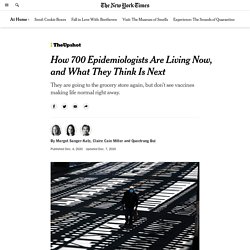
“I told you I thought things would be better by now. I was very wrong. They are dramatically worse.” Most scientists say around 70 percent of the population will need to be immune for the United States to reach herd immunity, when the virus slows down significantly or stops. Donald Trump's Strength Did Not Beat the Coronavirus. American society has long portrayed strength “as the opposite of disability and feminization,” Wool says.

“Those go together, and are seen to be incapacitating. Donald Trump's Strength Did Not Beat the Coronavirus. How to Identify the Different Symptoms of the Flu and Covid-19. In severe cases, the most common complication is pneumonia.
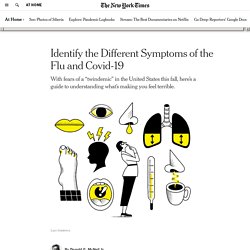
The typical signs of a flu pneumonia are shortness of breath, especially when you exert yourself, and unusually rapid breathing — doctors typically look for that in children — and sometimes pain in the chest or back. Knowing whether you have Covid-19 is much more complicated because there are so many different — and sometimes pretty wacky — symptoms, many of which echo those of the flu. The most common symptoms are high fever, sometimes with chills, a dry cough and fatigue. The one sign that really distinguishes the two infections is that many Covid-19 victims suddenly lose their sense of smell — not because they have a stuffy nose, but because they don’t register even strong odors like onions or coffee. Not all virus victims get anosmia, the formal name for loss of smell, but one study found that 87 percent did. How the Coronavirus Attacks the Brain.
The coronavirus targets the lungs foremost, but also the kidneys, liver and blood vessels.
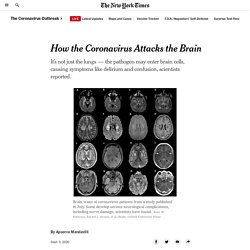
Still, about half of patients report neurological symptoms, including headaches, confusion and delirium, suggesting the virus may also attack the brain. A new study offers the first clear evidence that, in some people, the coronavirus invades brain cells, hijacking them to make copies of itself. The virus also seems to suck up all of the oxygen nearby, starving neighboring cells to death. It’s unclear how the virus gets to the brain or how often it sets off this trail of destruction. Infection of the brain is likely to be rare, but some people may be susceptible because of their genetic backgrounds, a high viral load or other reasons. “If the brain does become infected, it could have a lethal consequence,” said Akiko Iwasaki, an immunologist at Yale University who led the work. Coronavirus Can Be Deadly for Young Adults, Too, Study Finds. Stanford University doctors and researchers are sounding the alarm about one of their colleagues, Dr.
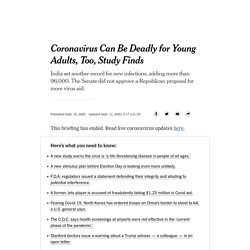
Scott W. Atlas, a newly influential member of the White House coronavirus task force. Dozens of infectious, epidemiological and health policy experts published an open letter on Wednesday, saying they “have both a moral and an ethical responsibility to call attention to the falsehoods and misrepresentations of science recently fostered by” Dr. Atlas. “Many of his opinions and statements run counter to established science and, by doing so, undermine public-health authorities and the credible science that guides effective public health policy,” they wrote. Dr. Dr. The viral universe - Viruses have big impacts on ecology and evolution as well as human health. IThe outsiders inside HUMANS ARE lucky to live a hundred years.
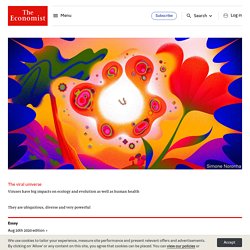
Responding to covid-19 - Nicholas Christakis on fighting covid-19 by truly understanding the virus. SEVEN VARIETIES of coronavirus infect humans: four give us the sniffles; one causes a deadly disease smouldering in the Middle East since 2012; and two erupted into full-on pandemics. The first caused SARS and it petered out quickly. The other causes covid-19 and it has hobbled the global economy. Why the difference?
It is not only a matter of the public-health response or governmental incompetence (though that has certainly made things worse). It also has to do with the underlying epidemiology of the pathogen, which we are coming to appreciate, after little more than a half-year of experience. SARS, caused by the virus known as SARS-CoV-1, appeared in 2002 and spread to 30 countries. On the surface, the pathogens have several aspects in common, beyond belonging to the same family of coronaviruses (and having genetic sequences that are 79% identical). Could My Symptoms Be Covid-19? If you have a symptom that might be Covid-19, doctors say you should isolate until you can be tested.
Most patients will recover on their own within a few weeks. It’s a good idea to monitor oxygen levels at home with a pulse oximeter. Pay close attention to symptoms during days five to 10 of the illness, when oxygen levels may drop to dangerously low levels. Seek medical care at any time if you experience trouble breathing, any concerning symptom or take a turn for the worse. Coronavirus - The inside story of Britain’s fight against covid-19. On the evening of Friday March 6th, Nicola Rudkin, a senior nurse at the Royal London Hospital in the East End of London, met two colleagues in her cramped office.
A whiteboard, still covered with scribbled plans for making operating theatres more efficient, seemed like a relic from another time. The virus was now their most pressing concern. Rudkin had spent the first week of March “frenzied”. Staff were fitted for masks and had practised the laborious process of donning and doffing protective gowns, gloves and goggles. Plans were drawn up in case public transport was shut down or schools were closed. Covid 19 attacks organs. CDC: One-third of COVID-19 patients who aren't hospitalized have long-term illness. The Centers for Disease Control and Prevention acknowledged Friday that a significant number of COVID-19 patients do not recover quickly, and instead experience ongoing symptoms, such as fatigue and cough.
As many as a third of patients who were never sick enough to be hospitalized are not back to their usual health up to three weeks after their diagnosis, the report found. Full coverage of the coronavirus outbreak "COVID-19 can result in prolonged illness even among persons with milder outpatient illness, including young adults," the report's authors wrote. The acknowledgement is welcome news to patients who call themselves "long-haulers" — suffering from debilitating symptoms weeks and even months after their initial infection.
Can You Become Reinfected With Covid-19? It's Very Unlikely, Experts Say. Megan Kent, 37, a medical speech pathologist who lives just outside Boston, first tested positive for the virus on March 30, after her boyfriend became ill. She couldn’t smell or taste anything, she recalled, but otherwise felt fine. After a 14-day quarantine, she went back to work at Melrose Wakefield Hospital and also helped out at a nursing home. On May 8, Ms. Kent suddenly felt ill. The Best Way to Disinfect Masks Without Destroying Them – Smart Air. Coronavirus Drug and Treatment Tracker. Coronavirus symptoms fall into six different groupings, study finds. Immunity to Covid-19 could be lost in months, UK study suggests. People who have recovered from Covid-19 may lose their immunity to the disease within months, according to research suggesting the virus could reinfect people year after year, like common colds. In the first longitudinal study of its kind, scientists analysed the immune response of more than 90 patients and healthcare workers at Guy’s and St Thomas’ NHS foundation trust and found levels of antibodies that can destroy the virus peaked about three weeks after the onset of symptoms then swiftly declined.
Blood tests revealed that while 60% of people marshalled a “potent” antibody response at the height of their battle with the virus, only 17% retained the same potency three months later. Antibody levels fell as much as 23-fold over the period. COVID-19, not ‘just a flu’ – News. The avalanche of coronavirus infections in the current pandemic has been accompanied by a similar avalanche of information, making it hard to sift reliable news from the noise, according to Professor Mike Lee and Dr Sebastian Duchene in their The Conversation article (reproduced below, originally published on 17 March.)
Warning of serious brain disorders in people with mild coronavirus symptoms. Doctors may be missing signs of serious and potentially fatal brain disorders triggered by coronavirus, as they emerge in mildly affected or recovering patients, scientists have warned. Neurologists are on Wednesday publishing details of more than 40 UK Covid-19 patients whose complications ranged from brain inflammation and delirium to nerve damage and stroke.
In some cases, the neurological problem was the patient’s first and main symptom. Prevalence of SARS-CoV-2 in Spain (ENE-COVID): a nationwide, population-based seroepidemiological study - The Lancet. What Is ‘Covid Toe’? Maybe a Strange Sign of Coronavirus Infection. Before the coronavirus outbreak, Dr. Lindy Fox, a dermatologist in San Francisco, used to see four or five patients a year with chilblains — painful red or purple lesions that typically emerge on fingers or toes in the winter. Think a 'mild' case of Covid-19 doesn’t sound so bad? Think again.
Conventional wisdom suggests that when a sickness is mild, it’s not too much to worry about. How Covid-19 can damage the brain - BBC Future. In France, Helms knows better than almost anyone how intense the neurological impacts can be. We needed to delay her interview with the BBC after one of her Covid-19 patients – who was discharged from the hospital two months ago, but is still suffering from viral fatigue and severe depression – required urgent consultation for suicidal risk.
'It feels endless': four women struggling to recover from Covid-19. PTSD. The paths of destruction - How SARS-CoV-2 causes disease and death in covid-19. Obesity and coronavirus: how can a higher BMI increase your risk? Six Months of Coronavirus: Here’s Some of What We’ve Learned. After 6 Months, Important Mysteries About Coronavirus Endure.
Monster or Machine? A Profile of the Coronavirus at 6 Months. Why we might not get a coronavirus vaccine. Type 1 diabetics more likely than type 2 to die of coronavirus – study. 'Weird as hell’: the Covid-19 patients who have symptoms for months. Coronavirus Vaccine Prospects. Coronavirus long-term effects: Some Covid-19 survivors face lung scarring, heart damage, and anxiety. Will Covid-19 mutate into a more dangerous virus? The New Zealand strains: How coronavirus got here and what are its mutations. Why Are More Men Than Women Dying Of COVID-19? How to Develop a COVID-19 Vaccine for All by Mariana Mazzucato & Els Torreele. Lingering and painful: the long and unclear road to coronavirus recovery.
British BAME Covid-19 death rate 'more than twice that of whites' Wellcome Open Research. Travel - The healthiest countries to live in. Coronavirus 'serosurvey' results are coming. Here's how to kick their tires. Hydroxychloroquine and coronavirus: a guide to the scientific studies so far. The coronavirus was not engineered in a lab. Here's how we know. Air pollution may be ‘key contributor’ to Covid-19 deaths – study. So many candidates, so little time - Can the world find a good covid-19 vaccine quickly enough? Obesity Linked to Severe Coronavirus Disease, Especially for Younger Patients.
Covid 19 attacks organs. COVID-19 IMPACT ON KIDNEY FUNCTION. The Coronavirus Patients Betrayed by Their Own Immune Systems. Herd immunity in California? A Stanford expert on why we're nowhere close. What is post-pandemic? What Doctors on the Front Lines Wish They’d Known a Month Ago. Please, Don't Intentionally Infect Yourself With Coronavirus. Coronavirus: Comparing COVID-19, SARS and MERS. How Coronavirus Attacks the Body. Doctor's Note: Why are young people dying from coronavirus? COVID-19, not ‘just a flu’ – News. Have I already had Covid-19? How would I know and what should I do?